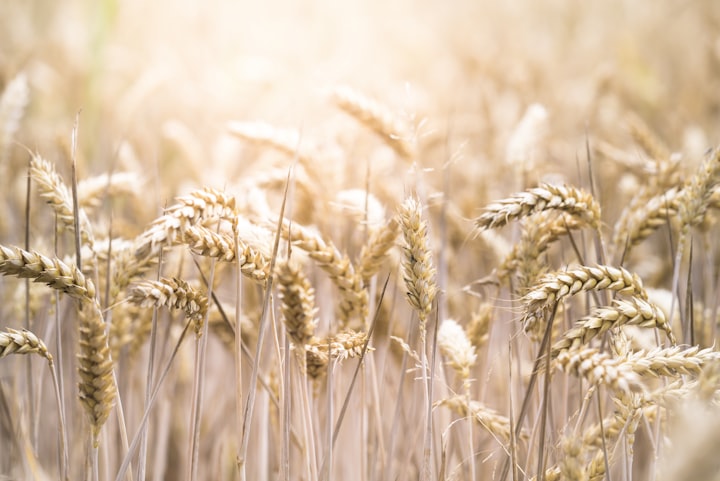
Wheat, one of the most widely cultivated and consumed grains in the world, offers numerous benefits.
The origin of wheat can be traced back to ancient times, and it is believed to have originated in the Fertile Crescent, a region in the Middle East encompassing modern-day Iraq, Syria, Jordan, Lebanon, Israel, and Palestine. This area is often referred to as the "cradle of civilization" because it is where early human societies began to develop agriculture around 10,000 to 12,000 years ago.
Wheat was one of the first domesticated crops and played a crucial role in the development of agriculture. The cultivation of wheat provided a stable food source, which allowed humans to transition from a nomadic hunter-gatherer lifestyle to settled farming communities. Over time, wheat spread to other regions through trade, migration, and agricultural expansion.
From its origins in the Fertile Crescent, wheat cultivation gradually expanded to other parts of the world. Today, wheat is grown in diverse regions across the globe, including North America, Europe, Asia, Australia, and Africa. It is one of the most important staple crops, providing a significant portion of the world's dietary energy and nutrition.
Here are 50 benefits of wheat:
1. Rich source of dietary fiber, aiding digestion.
2. Provides energy due to its high carbohydrate content.
3. Contains essential nutrients like vitamins B1, B3, and B6.
4. Offers a good source of minerals such as iron, magnesium, and zinc.
5. Supports healthy brain function and development.
6. Helps regulate blood sugar levels due to its low glycemic index.
7. Promotes cardiovascular health by reducing the risk of heart disease.
8. Assists in maintaining a healthy weight as it provides a feeling of fullness.
9. Helps prevent constipation and promotes regular bowel movements.
10. Supports a healthy metabolism and aids in weight management.
11. Contains antioxidants that protect against free radicals and oxidative stress.
12. Enhances immune system function due to its content of vitamins and minerals.
13. Promotes healthy skin and hair due to its B vitamin content.
14. Supports muscle growth and repair due to its protein content.
15. Aids in reducing the risk of certain cancers, such as colorectal cancer.
16. Assists in reducing the risk of developing gallstones.
17. Supports bone health and helps prevent conditions like osteoporosis.
18. Contains phytonutrients that may help reduce inflammation in the body.
19. Helps maintain healthy blood pressure levels.
20. Supports the production of red blood cells due to its iron content.
21. May help reduce the risk of developing type 2 diabetes.
22. Supports the production of neurotransmitters, promoting healthy brain function.
23. Provides a good source of energy for athletes and active individuals.
24. May help improve fertility in both men and women.
25. Supports eye health due to its content of vitamin E and other antioxidants.
26. Assists in reducing the risk of developing metabolic syndrome.
27. Provides a good source of prebiotic fibers, promoting a healthy gut microbiome.
28. Supports liver health and aids in detoxification processes.
29. May help reduce the risk of developing asthma in children.
30. Offers anti-inflammatory properties that can help alleviate arthritis symptoms.
31. Supports healthy kidney function and may help prevent kidney stones.
32. Assists in reducing the risk of developing age-related macular degeneration.
33. Provides essential nutrients for pregnant women, supporting fetal development.
34. Supports a healthy nervous system and helps prevent neuropathy.
35. May help reduce the risk of stroke.
36. Assists in reducing the risk of developing metabolic disorders.
37. Supports the growth and repair of body tissues due to its protein content.
38. Provides a good source of complex carbohydrates for sustained energy.
39. Supports the production of serotonin, promoting positive mood and mental health.
40. May help reduce the risk of developing chronic inflammatory diseases.
41. Assists in reducing the risk of developing celiac disease in some individuals.
42. Provides a good source of dietary fiber, aiding in weight management.
43. Supports the production of collagen, promoting healthy skin elasticity.
44. May help reduce the risk of developing age-related cognitive decline.
45. Assists in reducing the risk of developing non-alcoholic fatty liver disease.
46. Supports the production of enzymes and hormones in the body.
47. May help reduce the risk of developing gallbladder disease.
48. Assists in reducing the risk of developing diverticular disease.
49. Provides a good source of folate, supporting proper fetal development.
50. Supports a healthy gut microbiome, promoting overall digestive health.
It's important to note that individuals with gluten sensitivity or celiac disease should avoid wheat or opt for gluten-free alternatives.
About the Creator
Shamreena
Spread love and be loved by love💌.






Comments
There are no comments for this story
Be the first to respond and start the conversation.